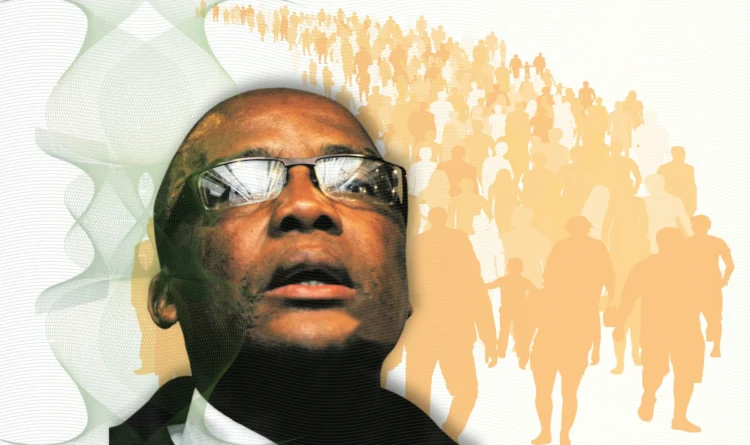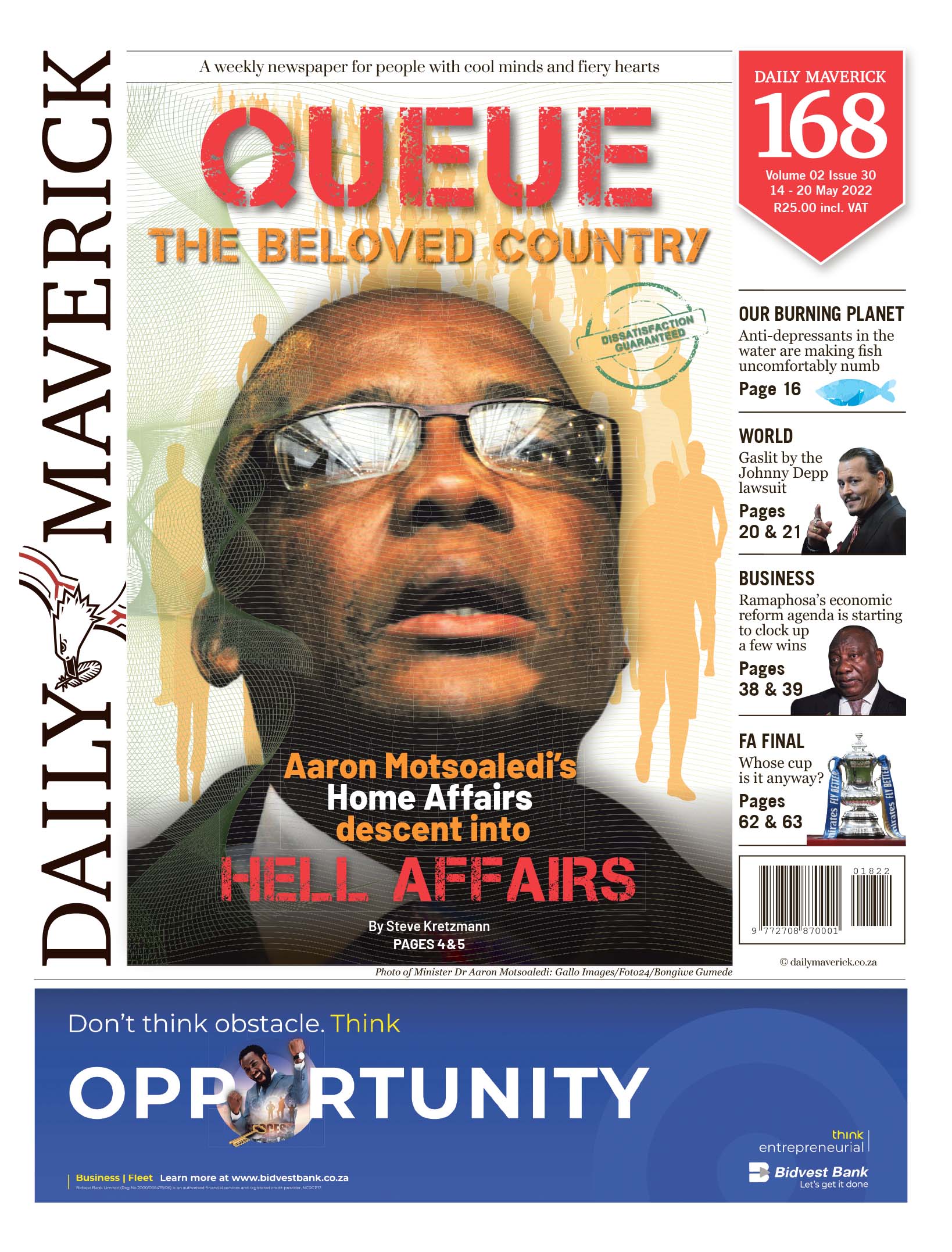The Home Affairs director-general has told Parliament that there are 9,025 unfunded vacancies in the Civic Services branch alone. Staff shortages, budget cuts and regular network failures are causing block-long queues outside offices across the country.

Day-long queues have become a permanent feature outside Home Affairs offices across the country, from Johannesburg to Stellenbosch and Cape Town. Although the top brass are trying to solve the causes, a budget shortage means the issue won’t be sorted out in the near future, despite a “war on queues” programme initiated in 2018.
The problem appears to be that Treasury, crumbling under multiple pressures, does not have the money.
Briefing Parliament on 31 August last year, Director-General of Home Affairs Livhuwani Makhode said only 37% of civic services posts at Home Affairs were filled, adding that the 9,025 vacant posts were unfunded. Civic Services is the branch dealing with citizens’ applications within the 412 Home Affairs offices nationwide, as well as at about 100 mobile units and 27 bank branches.
This includes clerks servicing clients, various functions such as fingerprinting and biometrics capture, and back-office staff processing document applications.
Even the approved and funded posts are not filled.
According to the department’s latest 2020/21 annual report, the total number of funded staff positions across all three Home Affairs programmes – administration, citizen affairs and immigration affairs – is 8,617. Of these, 8,451 posts are filled, leaving 166 vacancies. In citizen affairs, 52 funded posts are vacant.
The 9,025 civic services vacancies – more than double the current staff contingent of all three divisions – are not mentioned in the annual report, possibly because they are unfunded and thus not approved.
Questions about the unfunded vacancies sent to Home Affairs spokesperson David Hlabane have not been answered despite having initially been sent in February, with a blue-ticked WhatsApp follow-up, and continual follow-ups over the past week via email and WhatsApp. Additionally, no response to budgetary questions has been forthcoming from Treasury.
As reported by DM168’s Rebecca Pitt, the department, in its annual performance presentation plan of 26 April, requested an additional R266-million from Treasury for employment compensation to fill 762 vacant posts (427 for civic services, 328 for immigration services and seven for information services).
The Western Cape manager for the public servants’ union, the Public Servants’ Association (PSA) of South Africa, Aileen Mosetic, said Home Affairs only had about 47% of the staff they needed.
“For example, in the Stellenbosch office there are nine officers and there should be 42,” said Mosetic.
“So there are huge shortages. It’s a national matter and spills into all the provinces.”
She said the matter was one of 40 issues currently being dealt with at the bargaining council, and although staff shortages were prevalent in all civil service departments, Home Affairs “clearly needs more staff”.
However, she said news from the bargaining chamber was that approval had just been received for a further 1,000 posts at Home Affairs, to be advertised in the current financial year beginning 1 April. Adverts had already started going out, she said. These posts excluded border management, which would be getting its own posts.
There are also vacancies in critical senior posts. The annual report states that the post of chief information officer, deputy director-general for counter corruption, as well as security services posts, are vacant. Legal services, policy, the Standing Committee for Refugee Affairs, the Refugee Appeals Authority, risk management and the inspectorate are “undercapacitated”.
Budget cuts
The Department of Home Affairs’ annual report notes the 2020/21 budget of R8,787,408,000 (R8.8-billion) was R740-million less than the previous year’s budget of R9,527,704,000 (R9.5-billion). This was owing to budget cuts imposed by Treasury for Covid-19 expenditure and on cost of employment, as well as the department achieving R563-million less in projected revenue from payments for services owing to office closures during Covid-19 lockdowns.
Overtime payments to staff in order to meet some targets resulted in “reducing much-needed funding for the filling of critical vacancies in the front line”, states the annual report. The budget for salaries was reduced over the Medium Term Expenditure Framework, resulting in the department being “unable to create posts or fill vacancies as posts were unfunded as and when posts were vacated”.
Funds also had to be reprioritised for the Border Management Authority (R80-million), digitisation of records (R18-million) and ministerial committees of inquiry (R10-million).
Attempts to open offices on Saturdays, which would also allow pupils requiring documentation to avoid missing school, or service people who were unable to take leave from work, have been stymied by a combination of unions and a lack of funds.
The PSA, according to national spokesperson Reuben Maleka, demands staff be paid overtime should they be required to work on Saturdays. As indicated in the annual report, the department is already struggling with a limited budget to pay employees.
Broken connections
Queuing outside Home Affairs before sunrise is no guarantee of making it into the building before sunset. On-the-ground experience is that Home Affairs offices regularly go offline, effectively shutting down applications for documents until the system is back online. This may take hours, or even the entire day. Even trying to evade the queues by getting an appointment via the department’s new e-booking system can be frustrating for those with internet connections or sufficient data. The website was inaccessible for at least two days this past week.
System downtime continues to frustrate clients and staff, as there are no viable alternatives, the department admits in its annual report.
To improve network uptime, the department concluded an agreement with the State Information Technology Agency (Sita) and Dimension Data in the 2018/19 financial year “to develop a network architecture appropriate for the department and to manage the telecommunication service providers”. At least R200-million is required for implementation, but the department did not have the budget, according to the annual report.
Yet, replying to a parliamentary question on 18 February posed by DA MP and Home Affairs committee member Adrian Roos, Minister of Home Affairs Aaron Motsoaledi said the downtime percentage during the 2020/21 financial year was just 1.26% and it was because of cable theft. The downtime percentage for April 2021 to February 2022 was 4.39% and it was because some offices don’t have generators during load shedding.
This is far from what DM168 has gathered from interviews with citizens trying to access services.
EFF parliamentary portfolio committee member Lorato Tito asked the minister what measures had been put in place to remedy the department’s “perennial connectivity problems” in light of the Sita CEO’s statement in September last year that the Department of Home Affairs’ choice of a “cheap network connectivity plan” was to blame.
Motsoaledi’s reply of 25 February was that the department had a bronze service-level agreement with Sita, which provided 95% service availability and resolution of disconnectivity within 16 hours. Yet it took Sita three to five days to resolve network issues.
“This means that even under the low level of bronze we are not necessarily getting what we signed for. It is true that Sita argued that we need to move to gold. Our question is: if even the low bronze standard can’t be met at that low level, how will a gold standard at a higher level be met?” stated Motsoaledi.
To answer this question, he said the department, together with Sita, had upgraded five offices to the gold service-level agreement to determine whether this would lead to improved network connectivity in those offices. The outcome of the proof of concept “is awaited”.
Last year Makhode told Parliament the department needed to upgrade its “dilapidated routers and switches”.
Sita spokesperson Tlali Tlali said the department’s local area network (LAN) and wireless area network (WAN) infrastructure is ageing and often “outright obsolete”.
Tlali said a 2019 assessment found 398 of the department’s 450 LAN devices were obsolete, and 112 of 395 WAN devices were obsolete. He said data from January and February this year showed online service reachability was 87.81% and 93.48% of the time, respectively.
“Reachability is defined as ‘the percentage of time the monitoring tools housed at Sita premises can communicate with an element or the device at the [Department of Home Affairs] offices’,” stated Tlali.
But the department was responsible for ensuring the IT infrastructure was always available at the premises, and Sita could only quantify the downtime experienced for the services it was responsible for. Applications, the LAN, routers and facilities were not in Sita’s ambit.
He said Treasury has approved a Sita request for permission to appoint an alternate provider for the core network, given that the current provider, Broadband Infraco, which uses the Transnet Freight Rail network, was severely affected by vandalism and the cable theft of railway lines. It would take 18 months for the new provider to be brought on board. Sita has also set R400-million aside to replace all legacy equipment that had reached its end of life to create a fit-for-purpose and scalable network.
Dilapidated offices
The annual report notes that only 195 of 412 offices have been modernised with live-capture systems for smart ID cards and passport applications.
Citizens not only have to spend hours in queues, they often have to do so outside dilapidated buildings. The annual report notes that some of their offices are “poorly located and do not meet the norms and standards set for modernised offices”. More than half (229 of 412) of the offices are leased from private landlords, often on a month-to-month basis, “leaving landlords with little incentive to maintain or upgrade their buildings”.
Home Affairs is dependent on the Department of Public Works and Infrastructure to acquire and maintain office space.
Queues for Africa
The lack of budget, lack of online connectivity, lack of modernisation in many offices and staff shortages, all of which also require efforts from other departments, combine to frustrate citizens’ needs to comply with obligations placed upon them by the state.
DM168 has reported on how citizens in Johannesburg and Stellenbosch wait in vain for an entire day to apply for identity documents or passports. The situation at the main Home Affairs office in Cape Town, Barrack Street, is no different.
The Barrack Street offices used to be able to process ID applications during a lunch hour. In 2017, it took less than an hour for this reporter to apply for a passport renewal and, similarly, it took 45 minutes to apply for a new ID in 2013.
But visits to the offices in November 2021 and February this year revealed a vast deterioration. At noon, people who had been queuing since 7am had still not got into the building. Arriving at 6am a few days later, two queues (one for ID applications and one for passport applications) stretched about 40m down the road. At 6.30am on 22 February, the queue had lengthened, stretching a distance of about 80m.

Informal opportunities
The dysfunction at Home Affairs has created opportunities for informal sector entrepreneurs. A group of about 20 homeless people have taken to sleeping on the street outside the Barrack Street office. As the queue starts gathering from as early as 5am, they sell their place at the front for R100 to latecomers arriving after 6am.
With about 200 people lined up, and the security guard having handed out numbers down the line, Andy Pierce was selling his place in the queue, number 14. At 27 years old, Pierce said he’s been living on the street since his mother died when he was 16. He said his father, who was violent, had left their home in Eerste River. He was earning some money by helping a trader on the Grand Parade offload and sell his goods twice a week, but getting a job in the formal economy is almost impossible, as he had never attended school. Asked why, he said, when he was in Grade 1 in Bonteheuwel, other children broke his leg because he was able to run faster than them. He never went back; his mother taught him to read and write.
With people having to line up for five hours or more before getting inside, 29-year-old Swazi Beja is earning an income hiring out plastic chairs.
Charging R5 a chair, Beja said he started his business in October after seeing someone doing it outside Home Affairs in Bellville. He bought 50 chairs for R600, and was making at least R250 per day, but says he has to pay R250 a week to store them nearby.
He said people started hiring chairs from 6am, but business was usually slow until midday, when people got tired and the shade disappeared.
While speaking to him, a woman hired two chairs, one for herself and one for her daughter, who was missing a day of school in order to apply for her ID. Beja disinfected and wiped the chairs down before handing them to her, offering to carry them to her place in the queue. He said he had completed a business course at the College of Cape Town.


Impact of state dysfunction
But while informal entrepreneurs are able to benefit from failures within Home Affairs, it is hampering people’s ability to work, study, find employment and take advantage of opportunities. Ashley Ramushwana was taking his second day off work to try to apply for his passport in order to take up the opportunity of working on a movie in Thailand. The former College of Magic student was number 75 in the passport application queue and it took from 7am to noon to get close to the Home Affairs office doors.
“They hand out 80 numbers a day,” said Ramushwana. “When the offices opened [at 8am], the queue was to the corner of the block.”
Speaking to DM168 on a Monday, he said he had initially come to Home Affairs at 10am the previous Friday to discover he would not get served and would have to return and line up early on Monday.
Even though he was near the door after queuing for five hours, he said an official had warned them the system could go offline at any time and they might have to leave.
He had checked the Home Affairs website to see if he could apply online but had had no success.
“The website is rubbish,” he said.
Sihle Cutshwa (24) from Dunoon was also in the queue, enduring the midday sun with her 10-month-old baby girl, Kanya, to apply for her ID, which she lost when her phone was stolen, as she kept her ID in her phone cover.
Luvuyo Ngqaza was spending a second day queuing, this time to collect his ID. He had arrived at 9am and, with the collections queue being shorter and moving faster, he was at the front of the queue at 11.45am. But to apply for his ID two weeks earlier, he had arrived at 6am and left at 3.30pm.
Unemployed, he had struggled to get the money to travel from Hout Bay, where he lives, to the city centre twice, as well as paying the R140 to get a new ID card.
Numerous other people spoken to informally told of having to take days off work, struggling to obtain money for transport and fees as some were unemployed; parents having to take their children out of school; and job seekers unable to look for work until they obtained their ID.

(Photo: Steve Kretzmann / WCN)
SPEAK OUT
We requested feedback on the Daily Maverick website, asking readers to share their experience of service at Home Affairs. This is a random selection of 178 notes received from readers:
“I am 69 years old and needed to renew my passport. I queued from 3am and walked out of there at 11.30am although I was the second person in the queue. They helped the chommies first.”
“DHA is overcontrolled by its Pretoria office. Branches are not permitted to fix errors on the DHA national computer system. Everything has to go to Pretoria for correction.”
“Praise where it is due! New Hanover Home Affairs completed my application for a new South African passport in 45 minutes. I collected the passport within six weeks and within 20 minutes of arrival.”
“I am a teacher and need to obtain a new passport. I have been 12 times and each time turned away because it will be too late to do my submission. I was told it could be done for R500.”
“Well how about requesting and paying for a non–abridged birth certificate in 2017 then told in 2018 to reorder and repay. Finally, the certificate was issued in 2020.”
“Ordered and paid for an unabridged birth certificate for my son so he could get his passport – never received it and the receipt faded due to the paper it was printed on, so no proof now!”
“Well, actually been good for me and mine. But for one of our employees, disaster – waited 10 years for confirmation of ID number and temporary document but still doesn’t have card.”
“Seamless recent experience: applied for passport and ID card online; paid online; made appointment at Killarney Jhb Home Affairs branch online. Wonderful, helpful staff – docs collected a month later!”
“I applied for SA citizenship September 2018 at Home Affairs Cape Town. My application was accepted after it was checked that all necessary documents were attached. I have heard nothing since.”
We are trying to map the quality of services at Home Affairs departments around the country. Share your experiences by filling in this quick survey. DM168
This story first appeared in our weekly Daily Maverick 168 newspaper, which is available countrywide for R25.



